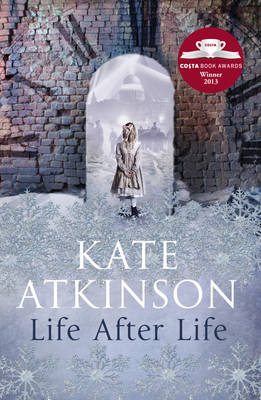Reviewed by brokentune on
Let me be blunt: I do not get the hype around this book.
I like the writing and I like the structure of the book, even though (or maybe because) I needed to flip back and forth a fair bit to get acquainted with all the characters. I thought the characters were well drawn, the conversations natural enough to be credible. Atkinson is pretty good at observations and it helps her writing. With respect to style, I really liked the book.
The main plot of the book, however, was not for me.
The concept of actively using reincarnation as a quasi-time travel device with the aim to kill Hitler was just not working for me. It doesn't tie up with the concepts of time and reincarnation put forward in the book in the discussions between Ursula and Dr. Kellet. It also cheapens the story by reducing it to a somewhat sensationalist retelling of history - which makes it appealing from a selling to the masses point but not much else. I may add that while Atkinson's attempt at compiling a history of Europe in the 20th century is still far superior to the attempt made by Ken Follett, this is not exactly high praise. (*Steps off soap box.*)
The great parts of the story are hidden in the various sub-plots, much like in Downton Abbey, which invariably follows a similar journey - except without the variations on possible outcomes based on the characters' acts. (Though, I would quite like the idea of a multiple-choice variant on Maggie Smith's character - this would be hilarious.)
So, having drawn similarities to two other works of popular culture already, let me also throw three more into the hat: Groundhog Day, Stephen Fry's Making History and, my favourite Sarah Waters story The Night Watch.
Mix 'em all up and - hey presto .....you might get something that resembles a rough draft of Life After Life.
Now, I'm not saying that the book was unoriginal. On the contrary, I thought the concept was well chosen and well developed. However, there are aspects of the book that just kept niggling at my enjoyment of it.
For one, I also could not help feeling that the original draft was still quite a bit longer than the final book. There were numerous references to books and quotes dropped in by a very clever author which seemed a little out of place. And I guess, that some of this due to editing and not being able to tie up some of the loose ends created by cutting out links which may have given further clues to the relevance of some of these references.
For example, it is mentioned that one of the characters was reading Greene's The Comedians. It's one of my favourite books, so obviously I'd like to know if there is a significance attributed to the character reading this particular book. Maybe it stood out for me because it is a favourite, but to my recollection it also stood out because there was no other mention of what a character was reading at any other time. So why mention it?
For another, being reminded of existing books and films or tv series, caused me to constantly compare Life After Life to these other works. And I have to say, it did not benefit Atkinson's creation (with the exception of the comparison to Fall of Giants, of course).
Being reminded of existing stories kept me wondering about the what ifs, which is ironic as this question goes back to the heart of Life After Life.
"History is all about "what ifs"."
Reading updates
- Started reading
- 17 November, 2015: Finished reading
- 17 November, 2015: Reviewed
